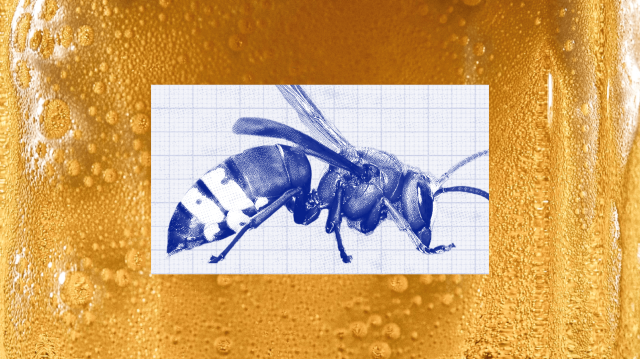
Sign up for the Smarter Faster newsletter
A weekly newsletter featuring the biggest ideas from the smartest people
If a 175 pound-man drank five one-liter handles of vodka in a day, he would die. But when a tiny Oriental hornet weighing half a gram consumes the equivalent amount of alcohol relative to its body size, it carries on like nothing happened.
Many animals, humans among them, imbibe alcohol. Pen-tailed tree shrews enjoy a boozy nectar produced by the bertam palm. African warthogs sometimes sup on fermented marula fruit. Humans down a couple IPAs at the local brew hall. But no matter how an animal chooses to consume alcohol, we all fall prey to its intoxicating effects.
Except for the Oriental hornet, it seems. In experiments recently described in the Proceedings of the National Academy of Sciences, researchers from Tel Aviv University in Israel plied these insects with enormous amounts of alcohol and watched as…nothing happened. They fed worker hornets solutions containing up to 80% ethanol for a week straight — a lengthy time for insects whose lifespan lasts only three months. The alcoholic hornets survived just as long as their abstaining counterparts and showed no signs of intoxication.
In another experiment, the scientists housed hornets with water, a sugar solution, and varying concentrated ethanol solutions, and let the insects choose what to drink. The insects consumed exorbitant amounts of the alcohol mixture over 24 hours — enough to kill a human many times over — yet were behaviorally and physically unaffected.
The researchers also fed bees similar amounts. Unlike their hornet cousins, bees became overtly inebriated, and many died the same day.
An alcohol-tolerating “superpower”
An explanation for Oriental hornets’ alcohol-tolerating superpower can be found in their genes. These insects have multiple copies of the alcohol dehydrogenase gene, the researchers found. This produces the enzyme that breaks down alcohol. The hornets likely evolved the extra copies over their long history of living with ethanol-producing yeasts. Many species of hornets and wasps harbor yeasts in their digestive systems. (Some brewers have even sampled these yeasts to craft new beers.) When they bite into fruits, they spread these single-celled fungi. The yeasts then ferment the fruit, creating alcohol.
What do hornets and wasps get for lugging yeasts around in their guts and delivering them to food sources? Access to extra energy, it seems. A gram of alcohol contains seven calories while a gram of sugar holds four. This makes alcohol a more efficient food source, provided consumers can handle the intoxicating effects. Encouraged by the yeast in their bodies, Oriental hornets apparently have evolved to do just that.
“To the best of our knowledge, Oriental hornets are the only animal in nature adapted to consuming alcohol as a metabolic fuel,” senior author Eran Levin of Tel Aviv University’s School of Zoology said in a statement.
Another benefit to the hornets: Alcohol kills potentially harmful bacteria. This comes in handy for hornet workers and larvae. Workers frequently collect carrion to nourish developing larvae.
Can the discovery come in handy for humans?
“With 5.3 percent of deaths in the world linked to alcohol consumption, we believe that, following our research, Oriental hornets could potentially be used to develop new models for studying alcoholism and the metabolism of alcohol,” Levin said.
In a commentary published in the wake of the study’s release, Prof. Dr. Rainer Spanagel at the University of Heidelberg agreed. Spanagel specializes in animal research on alcohol and drug addiction and translating the results to benefit humans.
“The study […] should serve as a wake-up call to develop new small molecules or repurpose drugs to specifically target alcohol metabolism genes, with the aim of reducing alcohol consumption or the harms associated with alcohol use disorder.”
Sign up for the Smarter Faster newsletter
A weekly newsletter featuring the biggest ideas from the smartest people
